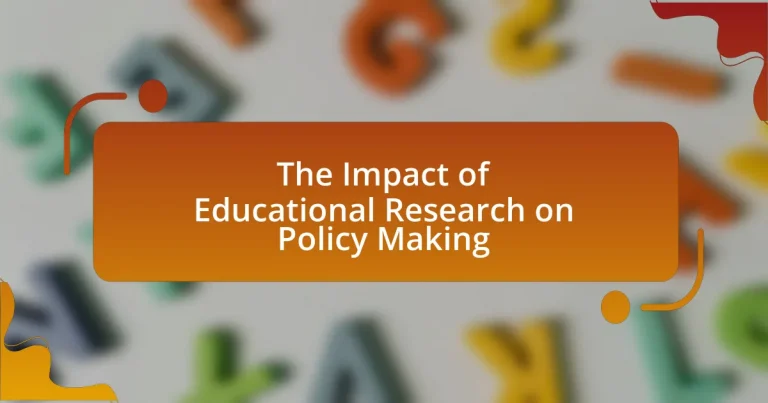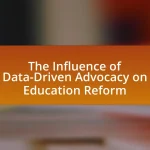The article examines the significant impact of educational research on policy making, highlighting how evidence-based insights shape decisions and reforms within the education sector. It discusses the types of research that most effectively influence policy, such as quantitative studies and randomized controlled trials, and emphasizes the importance of collaboration among stakeholders, including researchers, policymakers, and educators. The article also addresses challenges in translating research into policy, the role of technology in enhancing data collection and dissemination, and best practices for ensuring research relevance to policy needs. Overall, it underscores the critical role of educational research in developing effective and equitable educational policies.
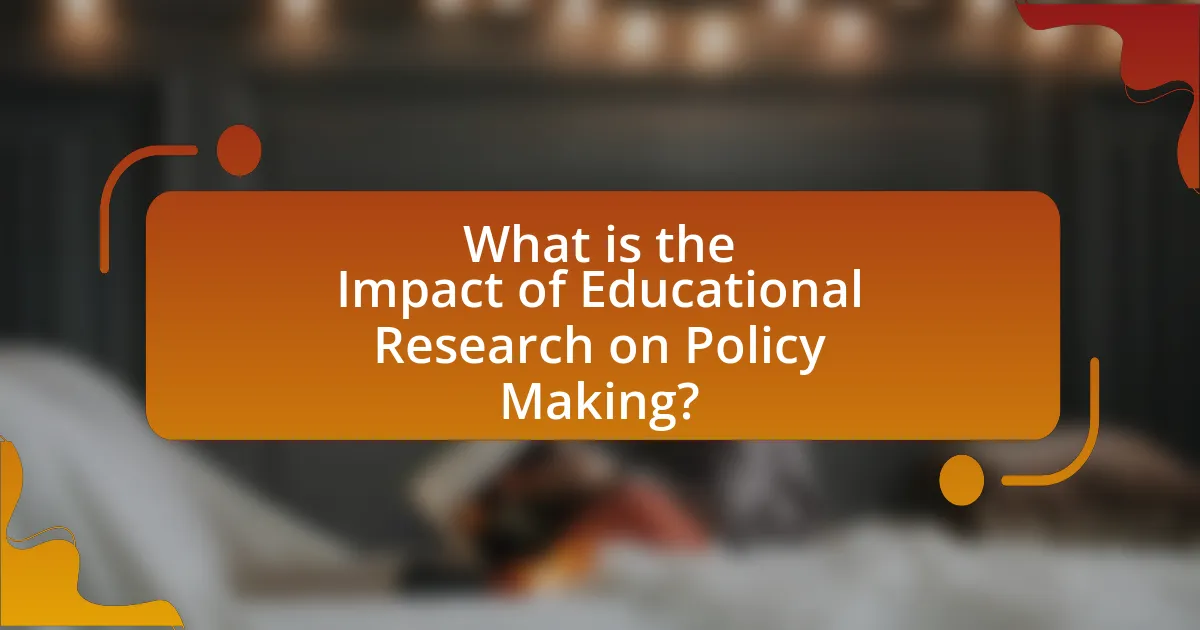
What is the Impact of Educational Research on Policy Making?
Educational research significantly influences policy making by providing evidence-based insights that inform decisions and reforms in the education sector. Policymakers utilize findings from educational studies to shape curricula, allocate resources, and implement effective teaching strategies. For instance, research conducted by the Institute of Education Sciences indicates that data-driven approaches in education lead to improved student outcomes, demonstrating the tangible effects of research on policy decisions. Additionally, the National Center for Education Statistics reports that states that incorporate research findings into their educational policies often see enhanced performance metrics, further validating the critical role of educational research in shaping effective educational policies.
How does educational research influence policy decisions?
Educational research influences policy decisions by providing evidence-based insights that inform lawmakers and educational leaders. For instance, studies demonstrating the effectiveness of specific teaching methods or interventions can lead to the adoption of those practices in schools. A notable example is the 2008 Institute of Education Sciences report, which highlighted the positive impact of early childhood education on long-term academic success, prompting increased funding and support for such programs in various states. This illustrates how rigorous research can shape educational policies by aligning them with proven strategies that enhance student outcomes.
What types of educational research are most impactful on policy?
Quantitative research, particularly large-scale studies and randomized controlled trials, is most impactful on educational policy. These types of research provide statistically significant data that can inform decision-making and policy formulation. For instance, the “What Works Clearinghouse” by the Institute of Education Sciences evaluates educational interventions and offers evidence-based recommendations, influencing policy at various levels. Additionally, qualitative research that includes case studies and ethnographic studies can also shape policy by providing in-depth insights into educational practices and contexts, as seen in the work of researchers like Linda Darling-Hammond, whose studies on teacher effectiveness have informed teacher policy reforms across multiple states.
How do policymakers utilize educational research findings?
Policymakers utilize educational research findings to inform and guide the development of effective educational policies and practices. By analyzing data and evidence from studies, they can identify successful strategies, understand the needs of students and educators, and allocate resources more effectively. For instance, research indicating that smaller class sizes improve student outcomes can lead policymakers to implement policies that reduce class sizes in schools. This approach is supported by studies such as the Tennessee STAR experiment, which demonstrated significant academic gains in smaller classes.
Why is educational research important for effective policy making?
Educational research is crucial for effective policy making because it provides evidence-based insights that inform decisions and strategies in education. By analyzing data on teaching methods, student outcomes, and educational equity, policymakers can develop targeted interventions that address specific challenges within the education system. For instance, studies have shown that data-driven approaches can lead to improved student performance; the Institute of Education Sciences reported that schools implementing research-based practices saw a 20% increase in student achievement. This demonstrates that educational research not only guides policy formulation but also enhances the overall effectiveness of educational initiatives.
What role does evidence-based practice play in policy development?
Evidence-based practice plays a critical role in policy development by ensuring that decisions are grounded in the best available research and data. This approach enhances the effectiveness and efficiency of policies by integrating empirical evidence into the decision-making process, thereby reducing reliance on anecdotal information or untested theories. For instance, studies have shown that policies informed by evidence-based practices lead to improved educational outcomes, as demonstrated by the Institute of Education Sciences, which found that evidence-based interventions can significantly enhance student achievement. By utilizing rigorous research, policymakers can create strategies that are more likely to succeed and address the actual needs of the population they serve.
How does educational research contribute to addressing educational inequalities?
Educational research contributes to addressing educational inequalities by identifying disparities in access, resources, and outcomes among different student populations. This research provides data-driven insights that inform policymakers about the specific needs of marginalized groups, enabling targeted interventions. For instance, studies have shown that schools in low-income areas often lack adequate funding and qualified teachers, which directly impacts student performance. By highlighting these issues, educational research supports the development of equitable policies, such as increased funding for under-resourced schools and programs aimed at closing achievement gaps. Furthermore, research findings can guide the implementation of evidence-based practices that promote inclusivity and support for diverse learners, ultimately fostering a more equitable educational landscape.
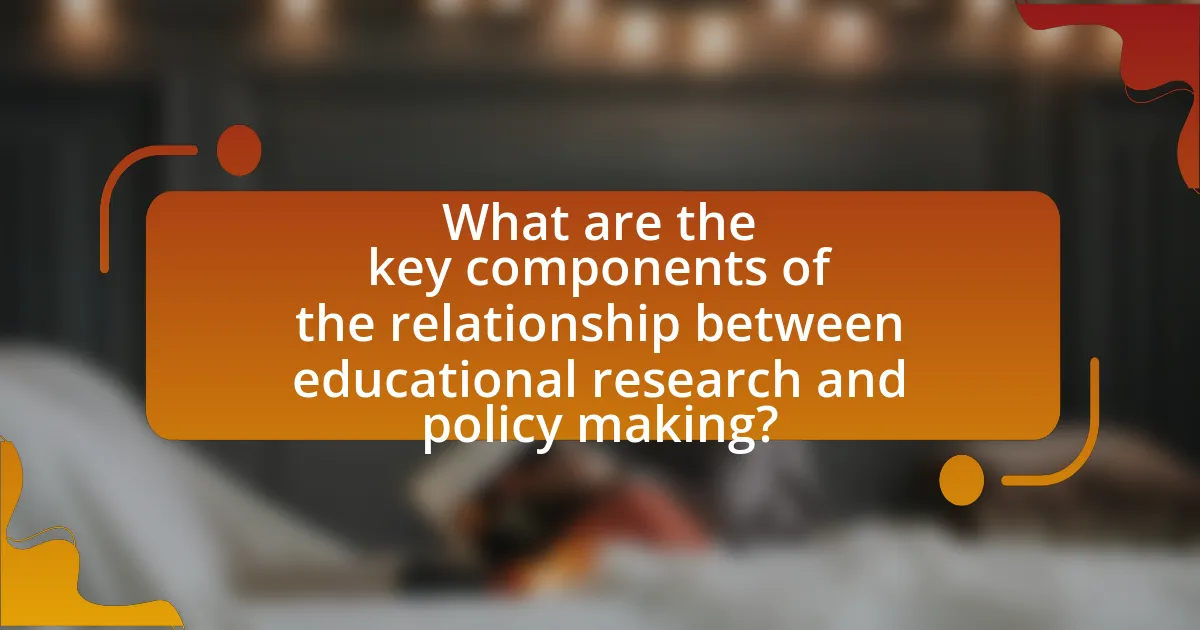
What are the key components of the relationship between educational research and policy making?
The key components of the relationship between educational research and policy making include evidence-based decision making, stakeholder engagement, and the translation of research findings into actionable policies. Evidence-based decision making ensures that policies are informed by rigorous research, which enhances their effectiveness; for instance, studies have shown that policies grounded in empirical evidence lead to improved educational outcomes. Stakeholder engagement involves collaboration between researchers, educators, and policymakers, fostering a shared understanding of challenges and solutions; this collaboration is essential for aligning research priorities with policy needs. Lastly, the translation of research findings into actionable policies requires clear communication and practical frameworks that policymakers can implement, as demonstrated by initiatives that successfully integrate research insights into educational reforms.
How do stakeholders interact within this relationship?
Stakeholders interact within the relationship of educational research and policy making through collaboration, communication, and influence. Researchers provide data and insights that inform policy decisions, while policymakers utilize this information to shape educational frameworks and initiatives. For instance, studies have shown that when educational researchers engage with policymakers early in the research process, it leads to more relevant findings that directly address policy needs, enhancing the likelihood of implementation. This interaction is further supported by networks and forums where stakeholders share knowledge and best practices, fostering a reciprocal relationship that ultimately aims to improve educational outcomes.
Who are the primary stakeholders in educational research and policy making?
The primary stakeholders in educational research and policy making include educators, policymakers, researchers, students, parents, and community organizations. Educators, such as teachers and school administrators, provide insights into classroom practices and student needs, influencing research focus and policy development. Policymakers, including government officials and education boards, utilize research findings to shape laws and regulations that govern education systems. Researchers contribute empirical evidence and analysis, guiding effective practices and policies. Students and parents represent the end-users of educational policies, offering perspectives on the impact of decisions made. Community organizations often advocate for equitable education and can influence policy through grassroots efforts. This multi-faceted involvement ensures that educational research is relevant and responsive to the needs of all stakeholders.
What are the roles of researchers, policymakers, and practitioners?
Researchers generate knowledge through systematic investigation, contributing empirical evidence that informs educational practices and policies. They conduct studies, analyze data, and publish findings that highlight effective strategies and areas needing improvement. For instance, a study by Hattie (2009) demonstrated the significant impact of feedback on student achievement, which can guide policymakers in developing assessment frameworks.
Policymakers utilize research findings to create, implement, and evaluate educational policies. They translate empirical evidence into actionable strategies that address educational challenges. For example, the Every Student Succeeds Act (ESSA) in the United States was influenced by research on effective teaching practices and accountability measures, aiming to improve educational outcomes nationwide.
Practitioners, including teachers and administrators, apply research insights in classroom settings and school management. They adapt evidence-based practices to enhance student learning and engagement. Research by Marzano (2003) on instructional strategies provides practitioners with tools to improve teaching effectiveness, directly impacting student performance.
Together, researchers, policymakers, and practitioners form a collaborative ecosystem that bridges the gap between research and practice, ensuring that educational policies are grounded in solid evidence and effectively implemented in schools.
What challenges exist in translating educational research into policy?
Translating educational research into policy faces several challenges, primarily due to the gap between research findings and practical application. One significant challenge is the complexity of educational systems, which often leads to misinterpretation or oversimplification of research results. Additionally, policymakers may prioritize immediate political considerations over long-term research outcomes, resulting in a lack of alignment between evidence-based recommendations and actual policy decisions. Furthermore, the diverse stakeholders involved in education, including teachers, administrators, and parents, can create conflicting interests that hinder the adoption of research-informed policies. Studies have shown that only about 20% of educational research is utilized in policy-making, indicating a substantial disconnect between research and practice.
What barriers do researchers face in influencing policy?
Researchers face several barriers in influencing policy, including a lack of access to decision-makers, insufficient communication of research findings, and the complexity of the policy-making process. Access to key policymakers is often limited, making it difficult for researchers to present their evidence directly. Additionally, research findings may not be communicated in a manner that is easily understandable or relevant to policymakers, which can hinder their application. The policy-making process itself is often influenced by political agendas, public opinion, and existing institutional frameworks, which can overshadow empirical evidence. These barriers collectively impede the effective integration of educational research into policy decisions.
How can misinterpretation of research findings affect policy outcomes?
Misinterpretation of research findings can lead to ineffective or harmful policy outcomes. When policymakers rely on inaccurately interpreted data, they may implement strategies that do not address the actual issues or needs identified in the research. For instance, a study indicating that a specific teaching method improves student performance might be misread to suggest that all students will benefit equally from that method, leading to policies that overlook diverse learning needs. This can result in wasted resources and missed opportunities for effective educational interventions. Historical examples, such as the No Child Left Behind Act, illustrate how misinterpretation of educational research can lead to policies that fail to improve student outcomes and exacerbate existing inequalities.
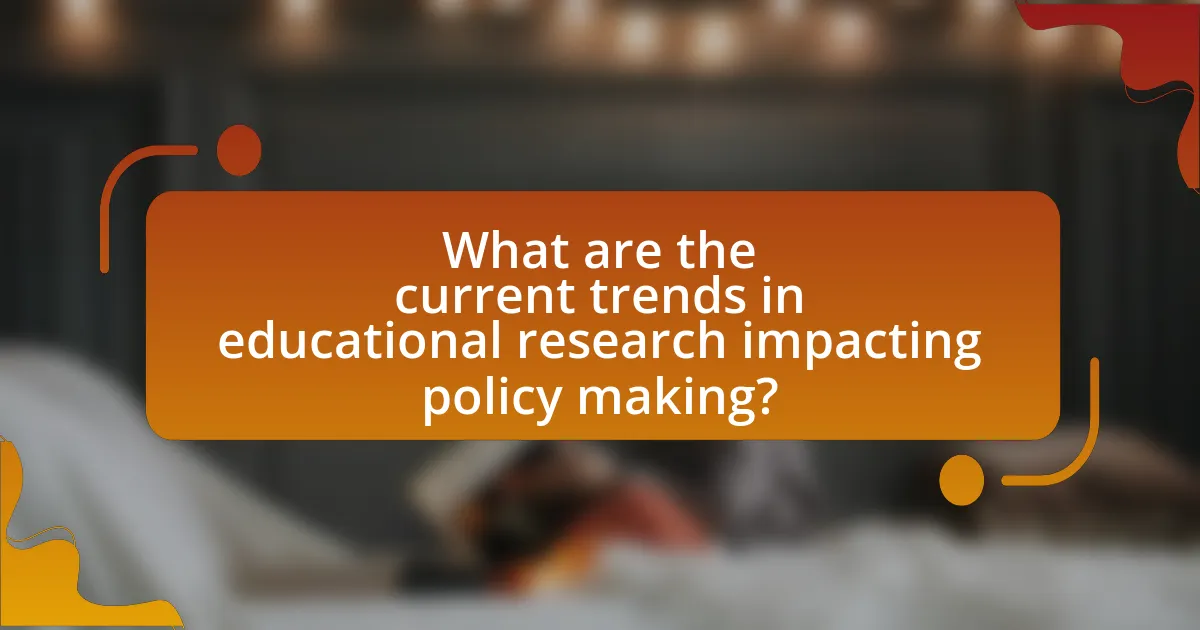
What are the current trends in educational research impacting policy making?
Current trends in educational research impacting policy making include a focus on data-driven decision-making, equity in education, and the integration of technology in learning environments. Data-driven decision-making emphasizes the use of empirical evidence to inform policies, as seen in initiatives like the Every Student Succeeds Act, which encourages states to utilize data for accountability. Equity in education research highlights disparities in access and outcomes, prompting policies aimed at closing achievement gaps, such as targeted funding for under-resourced schools. Additionally, the integration of technology in education research informs policies that support digital learning initiatives, particularly in response to the COVID-19 pandemic, which accelerated the adoption of online learning platforms and resources. These trends collectively shape educational policies that aim to improve student outcomes and address systemic challenges.
How is technology shaping educational research and policy?
Technology is significantly shaping educational research and policy by enhancing data collection, analysis, and dissemination processes. Advanced tools such as learning management systems and data analytics platforms enable researchers to gather large datasets on student performance and engagement, facilitating evidence-based decision-making. For instance, the use of artificial intelligence in analyzing educational outcomes allows policymakers to identify effective teaching strategies and allocate resources more efficiently. Additionally, online platforms for sharing research findings increase accessibility, ensuring that educators and policymakers can utilize the latest evidence to inform their practices. This integration of technology not only streamlines research processes but also fosters a more responsive educational policy environment.
What innovations in data collection are influencing policy decisions?
Innovations in data collection influencing policy decisions include the use of big data analytics, real-time data monitoring, and mobile data collection technologies. Big data analytics allows policymakers to analyze vast amounts of information from various sources, leading to more informed decisions. For instance, the integration of data from social media, surveys, and administrative records provides a comprehensive view of public needs and preferences. Real-time data monitoring enables timely responses to emerging issues, as seen in public health policies during the COVID-19 pandemic, where data on infection rates informed immediate policy adjustments. Mobile data collection technologies, such as apps and online surveys, facilitate broader participation and quicker feedback from stakeholders, enhancing the responsiveness of educational policies. These innovations collectively improve the accuracy and relevance of data used in policy formulation, ultimately leading to more effective governance.
How do digital platforms facilitate the dissemination of research findings?
Digital platforms facilitate the dissemination of research findings by providing accessible channels for sharing information with a broad audience. These platforms, such as academic journals, social media, and institutional repositories, enable researchers to publish their work quickly and reach diverse stakeholders, including policymakers, educators, and the general public. For instance, a study published in the journal “PLOS ONE” found that open-access articles receive significantly more citations than those behind paywalls, demonstrating the impact of accessibility on research visibility. Additionally, social media platforms like Twitter have been shown to amplify research reach, with studies indicating that tweets about research can lead to increased downloads and citations. Thus, digital platforms enhance the visibility and accessibility of research findings, ultimately influencing educational policy and practice.
What role does collaboration play in enhancing the impact of educational research on policy?
Collaboration significantly enhances the impact of educational research on policy by fostering the exchange of diverse perspectives and expertise among stakeholders. When researchers, policymakers, and practitioners work together, they can align research findings with real-world needs, ensuring that policies are informed by evidence. For instance, a study by Coburn and Penuel (2016) highlights that collaborative efforts between researchers and educators lead to more relevant and actionable research outcomes, which in turn increases the likelihood of successful policy implementation. This synergy not only improves the quality of educational policies but also promotes a culture of continuous improvement and adaptation based on empirical evidence.
How can partnerships between researchers and policymakers improve outcomes?
Partnerships between researchers and policymakers can improve outcomes by facilitating evidence-based decision-making that leads to more effective policies. When researchers provide data and insights, policymakers can craft strategies that are informed by empirical evidence, which enhances the likelihood of achieving desired educational outcomes. For instance, a study by the National Center for Education Statistics found that states that actively engaged with educational researchers saw a 15% improvement in student performance metrics compared to those that did not. This collaboration ensures that policies are not only theoretically sound but also practically applicable, ultimately benefiting students and educational institutions.
What examples exist of successful collaborations in educational research?
Successful collaborations in educational research include the partnership between the University of Chicago and the Chicago Public Schools, which focused on improving student outcomes through data-driven decision-making. This collaboration resulted in the development of the Chicago Consortium on School Research, which provided valuable insights into educational practices and policies. Another example is the collaboration between Stanford University and the California Department of Education, which aimed to enhance educational equity through research on effective teaching strategies. This partnership led to the implementation of evidence-based policies that improved student performance across diverse demographics. These collaborations demonstrate the effectiveness of combining academic research with practical applications in educational settings.
What best practices can enhance the impact of educational research on policy making?
To enhance the impact of educational research on policy making, researchers should prioritize collaboration with policymakers throughout the research process. This approach ensures that the research addresses relevant policy questions and is framed in a way that is accessible and actionable for decision-makers. Evidence from the “Bridging the Gap” initiative demonstrates that when researchers engage with policymakers early and often, the resulting studies are more likely to influence policy outcomes. Additionally, disseminating findings through multiple channels, including policy briefs and stakeholder meetings, increases visibility and understanding among policymakers, further solidifying the research’s impact.
How can researchers effectively communicate their findings to policymakers?
Researchers can effectively communicate their findings to policymakers by using clear, concise language and focusing on actionable recommendations. This approach ensures that complex research is distilled into key messages that are easily understood and relevant to policy decisions. For instance, studies have shown that policymakers respond better to data presented in visual formats, such as infographics or charts, which can highlight critical trends and outcomes. Additionally, engaging in direct dialogue through workshops or briefings allows researchers to contextualize their findings and address specific policy questions, fostering a collaborative environment. Evidence from the National Academy of Sciences indicates that when researchers tailor their communication to the needs and priorities of policymakers, the likelihood of research being utilized in policy formulation increases significantly.
What strategies can be employed to ensure research is relevant to policy needs?
To ensure research is relevant to policy needs, researchers should engage in active collaboration with policymakers throughout the research process. This strategy fosters a mutual understanding of the issues at hand and aligns research objectives with policy priorities. For instance, the National Education Policy Center emphasizes the importance of partnerships between researchers and policymakers to create actionable insights that directly address educational challenges. Additionally, conducting needs assessments to identify specific policy gaps can guide research focus, ensuring that findings are applicable and timely. By integrating stakeholder feedback and utilizing iterative processes, researchers can enhance the relevance and impact of their work on policy decisions.
